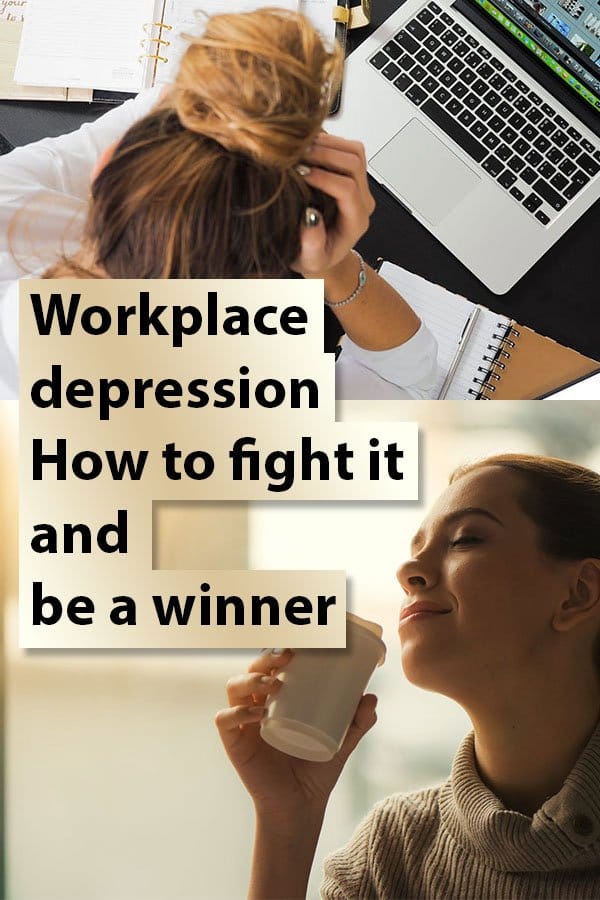“Depression is the most unpleasant thing I have ever experienced. . . . It is that absence of being able to envisage that you will ever be cheerful again. The absence of hope. That very deadened feeling, which is so very different from feeling sad. Sad hurts but it’s a healthy feeling. It is a necessary thing to feel. Depression is very different.” ― J.K. Rowling
Life is not easy when you suffer from the major depressive disorder (MDD). Day by day you’ll be facing sadness, irritation, fatigue, and loss of interest in the subjects that you loved in your daily routine.
It’s hard to cope up with these symptoms when you are at home. But it is quite painful when you are a work which requires your complete concentration for eight or more hours a day.

According to Mental Health America, one in 20 workers is suffering from depression at work at any given time. In another survey, 12% of workers added that they have been diagnosed with depression at some point in their working life.
Due to such major depression among the workers, the average lost time during work is approximately 172 million days yearly. Quite an astonishing figure…isn’t it?
While experiencing severe depression, it’s quite difficult to be a productive member of your team. You might miss your work timing, or frequently skipping the office because you’re dead tired, or being unmotivated you can’t perform well due to lack of concentration.
Yes, depression can make your work life more challenging than ever, and it is not at all good. But don’t lose hope so easily. You can still get back your motivation, focus, and productivity if you want to.
How? By coping up with your depression at your workplace. But to do that you need to find out the root cause of workplace depression.
Causes of workplace depression
- Financial problems- If you are paid less than what you deserve, it can make you stressed and worried. This situation may lead to depression.
- Wrong place for working- If you feel that this isn’t the place where you belong, a job that you shouldn’t be in, you’ll feel suffocated and depressed. Allen Miller, an HR manager at Paper Fellows added- ”This happens when you’re working in a job you dislike, but feel you can’t leave. It could be that you feel you must work here to pay your rent, or to keep up appearances. Either way, it can cause you harm.”
- Unfair demands- If your boss wants you to work more than one overtime, and if this keeps happening every week, it can be a major cause of depression. Interference in your personal life can ruin the balance of your work life and can certainly lead to depression.
- Unclear guidance- If you are not getting a proper guidance at your work, and don’t understand what your boss is expecting from you, you might feel yourself in the dark and become uncertain about whether you are performing at all or just wasting your time.
- Getting bullied- Workplace bullying is a common problem for everyone. The situation becomes worse when many workers don’t report what has happened. If you’re facing the same issue and your seniors are constantly manipulating you by making fun of your work, then this can easily lead to depression.
- Parenting issues- You may not have enough time to spend with your kids. But due to work pressure, it might not be possible. But you have to keep working for maintaining your family expenses. Keeping the balance is difficult. That would make you depressed.
“When you experience really painful feelings that just won’t go away—no matter what you do—and those feelings interfere with all areas of your life, it’s important to get support, as you may be experiencing signs of depression and anxiety,” – Aimee Barr, psychotherapist
Now that you have learned enough about the causes, let’s find out the symptoms or should I say “how to know I am depressed?”

Symptoms of workplace depression:
- Giving up hope- You might assume that everything is alright, and stop protesting or avoid raising your voice.
- Social Withdrawal- Keeping yourself away from friends, colleagues, and even from your family.
- Lack of activeness- You’ll not participate in any activity, whether it happens at your workplace or home.
- Decreased performance at work- You are performing below average, not even equal to your previous years’ performance.
- Missing deadlines- You might be getting slower at your work. As a result, you are missing your deadlines.
- Frustration- You might get frustrated in little issues that you might have ignored otherwise.
- Low self-esteem- You are getting ignored and become a laughing stock to others, but you didn’t respond to that.
“Mental pain is less dramatic than physical pain, but it is more common and also more hard to bear. The frequent attempt to conceal mental pain increases the burden: it is easier to say “My tooth is aching” than to say “My heart is broken.” ― C.S. Lewis, The Problem of Pain
Now you know how to identify that you are suffering from workplace depression.
Now we have to find out the cure to that problem. Depression isn’t something that will simply vanish away. You have to be patient, and with the right treatments, you can get out of this misery. Here are a few tips to help you cope with workplace depression.
a) Prioritize yourself first
Your job is important, but to meet the deadline or attend a meeting you should not ignore yourself. You must give the highest priority to your mental health. You can’t get anything done if you feel unmotivated and can’t concentrate on the work that is given to you.
Your life is an asset to you and your employer. So, take very good care of yourself and then get back to work. You must carry on with your work with renewed energy and a more positive outlook.
b) Take enough breaks
Research shows that with enough breaks, an employee can decrease stress, and increase dopamine, which can strengthen the neural connections. This way your memory and body function will start working properly. It is vital to refresh your mind, which may make you more productive.
c) Find Support
Paul Gionfriddo, president, and CEO of Mental Health America added- “Depression is no different from any other chronic condition. To stay with it and maintain an independent and productive life – it’s important to identify it, get the appropriate treatment and then stick with that treatment.” Paul Gionfriddo also explained – “People should be going back even as they would with any other doctor and say, ‘OK, is this the right med, is this the right course for me?”
If you are suffering from severe depression, then do not hesitate to reach out for professional counseling sessions or medications. Make sure you also know their side effects.
There are many popular and trust-worthy mental health clinics that can help you with depression, such as Savant Care Health Clinic.
d) Say “No” if you think so
If you start doing some productive things, you’ll have no time to become depressed. Many people believe that work addiction can keep you away from depression. Well, to some true extent. But the situation is different.
When doing overwork is the main cause of depression, then you should not hesitate to say no. If you believe that your colleagues can perform the work completely all by themselves, then you must step back for a while. Let others do their work. ASk some free space from them if you feel comfortable and supported.

e) Do things you enjoy
Severe mental health disorder such as depression doesn’t lift immediately. But you may get some breathing space as you make time for activities that you enjoy the most.
Pick up a former hobby or a sport such as fishing, golf, cycling, running, skateboarding, etc and relax a bit. Try to connect to nature as much as possible. On a busy weekend, go for a long ride towards the countryside, just as you like in your college days.
Express yourself creatively through music, art, or writing. Meet friends, take a day off from work and visit to a museum, the mountains, or watch movies.
f) Support your health
Try to sleep for Aim for eight hours. Depression increases insomnia so do not compromise with a night of good sleep. Ask your doctor and learn how to get on a better sleep schedule. Learn healthy sleep habits and follow them.
Avoid stress as much as possible. Stress can increase depression, so keep things out of your way that can create stress. Avoid work overload, money issues, or critical relationships, and find ways to manage your stress.
If you want to calm your mind, it’s better to practice relaxation techniques yoga, deep breathing, progressive muscle relaxation, or meditation. These ways are not only helpful for employees suffering from workplace depression, but it can be also beneficial for parents with postpartum depression.
Endnotes
No matter how many people experience anxiety and depression hampering their work performance, only 40% of them directly talk to their employer or to HR.
You must overcome that stigma and make those people aware of your situation. Many companies provide additional mental health services through the Employee Assistance Programs at a minimum or no cost.
If you’re unsure about the coverage you have, talk to HR and know in detail about the specifics of your plan.“You say you’re ‘depressed’ – all I see is resilience. You are allowed to feel messed up and inside out. It doesn’t mean you’re defective – it just means you’re human.” ― David Mitchell, Cloud Atlas


